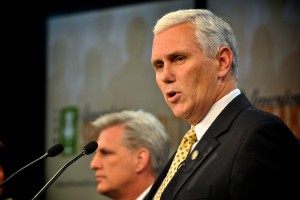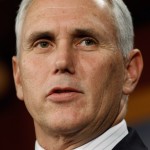How Education Could Factor Into A Pence Presidential Bid

Governor Mike Pence is often mentioned on the list of potential Republican nominees for the 2016 presidential election. (House GOP)
We’re almost two years away from the 2016 presidential election, but speculation, rumors and announcements are already in full swing. Many potential candidates are focusing on issues that took a backseat during the financial crisis, including education.
Gov. Mike Pence, R-Indiana, is often mentioned as a potential Republican candidate for the 2016 presidential election, and over the past year he has made a slew of education decisions many people say are proof he wants to be relevant on the national stage. Pence avoids directly answering the question of whether he’ll run, but if education is going to be a cornerstone of a political campaign, there’s a lot to look at in Indiana.
- Pence 2016? What The Governor's Education Policy Could Mean For A Presidential RunMike Pence’s name is often included on a list of potential presidential nominees for 2016. As that election gets closer, the governor is making education a prominent part of his legislative agenda, so we look into what these decisions look like on a national platform.Download
For starters, earlier this month Pence explained his legislative plan for the upcoming session, saying he wants it to be a session focused on education policy. But before the governor gives any more specifics on his plan, let’s examine his education policy decisions up until now, and what the could mean for a potential campaign.
Backing Out of the Common Core
Removing Indiana from the Common Core was one of Pence’s biggest education moves over the past year. The standards are not well liked by conservatives, who view them as a tool for too much federal oversight in local school districts, so earlier this year Pence signed legislation making Indiana the first state to make an exit.
“I think there’s enormous and justified concern that over time the Common Core became something that felt less like a state run program and more like something that became part of a federal agenda, being promoted by the Obama administration,” says Rick Hess, director of Education Policy Studies at the conservative non-profit American Enterprise Institute.
Although pulling out of the Common Core was a dramatic move with lasting consequences in Indiana, Hess says it would likely only serve as small bullet point on Pence’s resume during a 2016 campaign.
“I don’t think Common Core is going to be central to that conversation,” Hess says. “I could be wrong, but there will certainly be several candidates running who express skepticism on Common Core.”
In other words, pulling out of the Common Core probably won’t be enough to set Pence apart from the other Republican candidates.
“Being opposed to the Common Core would certainly set Pence off from Jeb Bush for instance,” Hess says. “But it would put him in the company of Marco Rubio, Bobby Jindal, Rand Paul. It would just be part of the conversation.”
Refusing federal preschool money
Another decision Pence made as governor that received national attention was refusing to allow the Indiana Department of Education to apply for a federal grant that would have helped fund pre-k. The grant could have given $80 million to preschool programs for low-income kids. Pence said instead the state would look at expanding its own new program, On My Way Pre-K.
Michael Wolf, who researches elections at the non-partisan Mike Downs Center on Politics in Indiana, says this decision was a no-brainer for a Republican looking to 2016.
“This might have been seen as accepting federal money in a pretty state sovereign area of public policy,” he says.
Wolf says Pence had a solid voting record against federal spending at the state level when he served in Congress and applying for this grant would look inconsistent if his political decisions are put under a microscope.
“This is purely inside baseball stuff”
Of the other education decisions Pence has made so far as governor, including creating and then dissolving the Center for Education and Career Innovation and being constantly at odds with state superintendent Glenda Ritz. Although these dominated headlines and played an important role in education policy, Hess says if Pence runs for president it won’t reach the masses.
“This is purely inside baseball stuff,” he says. “I’m surprised if anyone outside of Indiana even hears about it.”
Wolf says if Pence runs for president, he’ll address these choices in terms of consolidating government agencies to save the state money, despite creating CECI himself. And despite the competition or the success of his state policies, Wolf says the biggest challenge Pence will face, if he launches a presidential campaign, is actually the lack of changes he was able to make to education.
“He really has to demonstrate he can reform things and he doesn’t have a whole lot of territory because so much had been done in reform in the conservative direction under Mitch Daniels,” Wolf says. “So he’s probably going to pursue this pretty hard in this long session, and it’s very important for him to cover those bases against people.”
